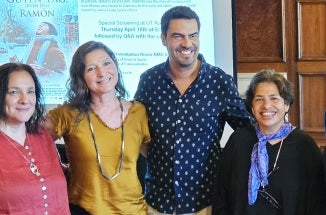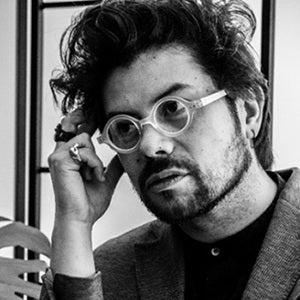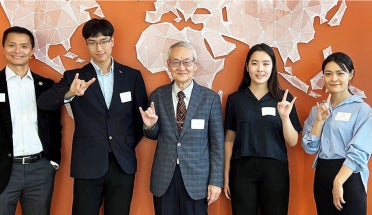
COMEXUS 2024 Visiting Chairs Bring Music, Film, Dance, Philosophy from Mexico
- Oct 10, 2024
- Global Initiatives
- by Ellen Stader
The University of Texas at Austin and the United States-Mexico Commission for Educational and Cultural Exchange (COMEXUS) partnered in 2022 to create the Fulbright-García Robles Visiting Chair on the Forty Acres. For this position, selected scholars from Mexico spend a semester in residence on the UT Austin campus teaching, conducting research and networking with the university community.
In addition to supporting the work of distinguished Mexican scholars, the residency also creates opportunities for cultural exchange and dissemination of research related to Mexico, strengthening U.S.-Mexico academic relations in the process.
COMEXUS was founded in 1990 to promote bilateral understanding between the U.S. and Mexico through educational and cultural exchange. With Fulbright-García Robles grants, COMEXUS supports Mexican and American students, researchers and teachers in postgraduate studies, research stays, teaching engagements and professionalization programs in both countries.
In January 2024, three professors from universities in Mexico came to UT Austin to serve as visiting chairs for the program, representing the fields of film, music, dance and philosophy. Texas Global was pleased to welcome these scholars to campus and learn about their work during the Spring 2024 semester.

Rodrigo Flores López
Composer and Professor,
Instituto Tecnológico y de Estudios Superiores de Monterrey, REC Música Centro de Estudios Musicales
“Aesthetics and Practice of Film Music in the United States and in Mexico”
Rodrigo Flores López is a professor at the Instituto Tecnológico y de Estudios Superiores de Monterrey, as well as an accomplished composer who has scored films in Mexico, Germany, the United Kingdom, U.S. and across Latin America.
Presented in conjunction with the Department of Radio-Television-Film (RTF) in the Moody College of Communication, his course aimed to explore methods of film music composition and collaboration between composers, directors and cinematographers.
“As a film composer, I have to learn what others are thinking [and] get into their worlds to be able to tell a story,” said Flores López. "That became an important aspect for me when coming here to talk to potential filmmakers at the department.”
The composer’s goal was to share and gain knowledge during discussions with student filmmakers and their professors in the department about the process of collaborating with composers.
“One of the things that I really liked about this opportunity was to be able to work with the film department," said Flores López. “[The students are] working on films, so they have questions about what they should do with choosing music or deciding how to work with a composer.”
Assistant Professor Miguel Alvarez in the Department of Radio-Television-Film facilitated conversations between Florez López and RTF students from numerous classes to explore real, nuts-and-bolts communication between the composer and filmmakers across the department.
“Something that tends to happen to film composers is that we don't get to interact with filmmaking people a lot,” said Flores López. “So I've been going to some of the classes to talk with the students about their projects, and that was a really nice opportunity for me.”

Claudia Lavista Fernández
Choreographer and Artistic Codirector, Escuela Profesional de Danza de Mazatlán and Delfos Danza Contemporánea
“Cross-Cultural Dance Understanding/Making Memory”
Working with UT's Department of Theatre and Dance at the College of Fine Arts, Claudia Lavista Fernández taught a course for UT dancers exploring directed movement to develop students’ tools and skills for dance composition.
“The best part is always working with young people,” said Lavista during an interview for the Theatre and Dance blog, Off Book. “There are so many things to learn from students, young dancers and creators. And I feel that this dialogue, from an artistic point of view, is very enriching for both me and them.”
Lavista also set a piece on Theatre and Dance students for April’s “Points of Intersection” dance concert. The work, titled “Óxido (Rusty)” was originally created for four dancers from Lavista’s company, Delfos Danza Contemporánea, but at UT, she created a version for nine dancers. Her collaborative style of choreographing worked well with the student group, Lavista said.
“I asked them, ‘How has this process been for you?’ And one of the things that they told me is that it was the first time that they felt really responsible about their own agency inside of the piece,” said Lavista. “What they are trying to do is to make a choreography something that is alive, like a living creature. And I appreciate that, because that is exactly what I try to do with my work.”
Besides the pleasures of working in the studio with student dancers, Lavista also acknowledged the benefits and advantages of working in residence on the Forty Acres.
“I feel that it’s very important to make stronger relationships between the U.S. and Mexico, and especially Texas and Mexico. That’s part of [the goal of] this Fulbright García-Robles [grant], and I’m really happy to be here and represent a little piece of contemporary art from Mexico.”

Abraham Sapién Córdoba
Philosopher and Postdoctoral Researcher, Universidad Autónoma del Estado de Morelos, Centro de Investigaciones en Ciencias Cognitivas
“Mexistentialism: Mexican Existentialist Philosophy”
Hosted by UT’s Department of Philosophy in the College of Liberal Arts, the work of Abraham Sapién Córdoba examines 100 years of philosophical texts through a “Mexistentialist” lens to evaluate philosophical, political and artistic expressions of culture from multiple angles.
The Teresa Lozano Long Institute of Latin American Studies welcomed the three scholars to describe their work as COMEXUS Visiting Chairs during “Usted Está Aquí (You Are Here): A Trialogue of Music, Dance and Philosophy,” a panel discussion held during the Spring 2024 semester.
At the gathering, Sapién illustrated his premise by exploring in English and Spanish the multiple meanings of the three words ‘You Are Here.’ He characterized them as indexicals, words whose meaning changes depending on when, where and how they are used — as well as in which languages.
“Being aware that all of us are ‘here’ in this room now, that creates a form of unity in and of itself,” said Sapién. “We are sharing space, time and also a form of value: We value spending time together here to communicate and get to know each other.”
Sapién explained this semantic practice as a demonstration of ‘Mexistentialist’ philosophy: analytical work that proposes multiple means of understanding concepts from differing points of view. He further focused this idea through an international lens.
“A lot of Mexican philosophy is about how to resolve tension and contrast,” said Sapién. “Instead of highlighting the tensions between Mexico and the U.S. at the borders, instead of thinking of what separates us, we want to talk about what unites us. We want to think about what we have in common and how we can create bridges in communication.”
Since 2023, UT Austin has hosted a total of six scholars under the COMEXUS Fulbright-García Robles Visiting Chair program, and in January 2025 will welcome a seventh: incoming scholar Raúl Tamez Carillo. An internationally renowned dancer and choreographer from Universidad Anáhuac, Carillo will work with the Department of Theatre and Dance to explore Martha Graham’s choreography and its relation to Mexico.



